
These recordings of pieces by John Cage were made at a performance called Silence & Transmission led by Peter Upreth conducting an ensemble of four performers using radios and voice, held at An Lanntair Arts Centre, Stornoway on the Isle of Lewis in the Outer Hebrides on 20th September 2012, as part of the celebrations for Cage's centenary.
Out of Stock
Quantity in Basket: None
Log In to use our Wish List
Shipping Weight: 3.00 units
Sample The Album:
Peter Urpeth-conductor, radio
Stuart Wilding-radio
Gerry Loose-radio
Jon Macleod-radio
John Cavanagh-radio, voice
John Cage-composer
Click an artist name above to see in-stock items for that artist.
UPC: 062415163040
Label: FMR
Catalog ID: FMRCD443-0217
Squidco Product Code: 24027
Format: CD
Condition: New
Released: 2017
Country: UK
Packaging: Digipack
Recorded at Silence and Transmission at the An Lanntair Arts Centre, in Stornoway, Isle Of Lewis, UK, on September 20th, 2012
"In September 2012, Peter Urpeth will lead a concert at An Lanntair, Stornoway, to mark the centenary of the birth of John Cage (Sept. 5, 1912) and the 20th anniversary of his death (Aug. 12, 1992).
The program will include a performance of Cage's Radio Music (1956), a piece that is to be performed as a solo or ensemble for 1 to 8 performers, each at one radio. Also on the program will be Cage's Music for Piano 26-36 & 37-52 (1955), Music for Piano 69-84 (1960), 4'33" (1952), and Imaginary Landscape No. 5 (1952) all receiving their first performances in the Outer Hebrides.
In a recent blog, Peter Urpeth also spoke a bit about Cage's Radio Music as being a kind of endangered species in the UK:
"-John Cage Trust"The poignancy of Radio Music is not simply in the fact that it celebrates the life and work of one of the most influential -- and to my mind interesting -- of musicians, but also because with the looming switch-off of the analogue radio signal in favour of the DAB type digital signal, it will be impossible to perform Cage's large oeuvre for radio (which includes Radio Music [1955] and Imaginary Landscape No. 4 [1951]) in the UK when the analogue signal is turned off for good in 2017.
Cage's Radio Music requires multiple, precise retunings of each radio during the performance according to a set list of frequencies (with some periods of silence), which do not change according to the geographical location of each specific performance and which therefore enables chance and random soundings to occur. In the Outer Hebrides we have access to very few radio stations even on the analogue signal, so a great deal of the performance here will consist of the white noise blur of the FM/AM radio spectrum. The simple fact is that the sequence of retunings cannot be achieved on the DB digital system. With digital radio you have all the available channels or none, and you cannot select an individual frequency to listen to if it is not part of a digital package.
A kind of performance could be achieved with different frequencies on the civil scanning systems of transport, emergency service, and CB radio signals, but the chance flirtations with popular music and speech radio in Cage's original will no longer be available.
It is my hunch that Cage might not have objected to this threat to his music, other than in the loss of a major domestic source of random noise. Digital is bringing us closer to silence, but a sterile kind of featureless silence. I'd go further and say that just as in Freud death is the real state of being and life a false interlude, so in Cage's music, noise longs for silence, and slowly Cage's music is returning to silence.
So, whilst it would be a beautiful act of futility to ask David Cameron to ensure the continuation of the analogue signal beyond 2017 for the sole purpose of enabling performances of Cage's music or as a resource for experimental musicians I think the gradual drift to silence of these pieces should be embraced."
Artist Biographies
• Show Bio for Peter Urpeth "Peter Urpeth has more than 30 years experience in the creative industries and in creative talent development. He is co-Director of Emergents Creatives - a social enterprise company funded by HIE and Creative Scotland - that supports and nurtures creative careers and the creative economy in the Highlands and Islands of Scotland, with particular focus on the writing, publishing, fashion, craft, design and textiles sectors. Originally Peter Urpeth was a jazz musician (pianist) working in free improvisation, and he has worked with some of the leading European musicians of the age including Evan Parker, Maggie Nicols, John Russell and Lol Coxhill. In the 1980s and 90s Peter Urpeth expanded his music career into journalism and artist management, becoming a music editor at Time Out magazine when it was the second highest selling consumer magazine title in Europe, and manager of the internationally renowned South African township pianist, Dollar Brand (Abdullah Ibrahim). In 1989, Peter Urpeth organized the first UK tour of South African township musicians in the Apartheid era, bringing Abdullah Ibrahim's Ekaya to play 13 sell-out nights at London's Jazz Cafe, to considerable critical and political acclaim. In the 1990s Peter Urpeth started working in music in theatre, performing live music to Steve Berkoff's Fall of The House of Usher and winning a Perrier Award at the Edinburgh Fringe for a musical with Donald Swann (Flanders & Swann). Later he would compose and perform nine further shows at Edinburgh Fringe before starting to write drama for stage performance. He was a regular performer in pantos, including accompanying Barbara Windsor in various seasonal melodies. As a journalist, Peter continued to cover the European and US new music scene, and he had international success with (front cover features for Jazz Hot, Paris, Jazz UK etc) his interviews with New York jazz musicians including John Zorn & Geri Allen, and a few articles that came from spending 8 days flat sharing in the company of young, unknown graphic artist Matt Groening. Fiction and poetry quickly followed the interest in drama, and in the mid 1990s Peter's poetry was first published in journals and magazines. Peter moved to Scotland and became a freelance arts journalist for The Herald and The Scotsman whilst working as a housing and homelessness advisor for Shelter. Peter's interviews with traditional Gaelic singers began appearing in leading folk and world music magazines in the late 1990s, including regular front cover features for Folk Roots and The Wire. In 1999 Peter became the editor of the Stornoway Gazette and a feature writer for The Observer. In 2002 Peter founded his own local newspaper, The Hebridean, selling it to its rival title two years later. In 2003, Peter Urpeth was awarded a Scottish Arts Council Writers Bursary and in 2006 his first novel, Far Inland, was published by Birlinn Polygon. In 2004, Peter became Talent Development Manager for HI-Arts, the arts development agency for the north of Scotland, developing Emergents Creatives after its closure. In 2012, Peter Urpeth delivered one of the 100 Nights for John Cage concerts - the international celebration of composer John Cage's centenary - and a performance that was broadcast live from Stornoway to New York, and was heard by over 750,000 radio listeners in the States. Peter Urpeth is currently working (with comedian Stewart Lee) on a biography of the jazz musician Evan Parker, and self-publishes digital poetry pamphlets. Recent music activity has included two major commissions for new scores and performances to silent, b&w vampire movies (Nosferatu and Vampyr) as part of the Faclan Festival." ^ Hide Bio for Peter Urpeth • Show Bio for John Cage "John Milton Cage Jr. (September 5, 1912 - August 12, 1992) was an American composer, music theorist, writer, philosopher, and artist. A pioneer of indeterminacy in music, electroacoustic music, and non-standard use of musical instruments, Cage was one of the leading figures of the post-war avant-garde. Critics have lauded him as one of the most influential American composers of the 20th century. He was also instrumental in the development of modern dance, mostly through his association with choreographer Merce Cunningham, who was also Cage's romantic partner for most of their lives. Cage is perhaps best known for his 1952 composition 4′33″, which is performed in the absence of deliberate sound; musicians who present the work do nothing aside from being present for the duration specified by the title. The content of the composition is not "four minutes and 33 seconds of silence," as is often assumed, but rather the sounds of the environment heard by the audience during performance. The work's challenge to assumed definitions about musicianship and musical experience made it a popular and controversial topic both in musicology and the broader aesthetics of art and performance. Cage was also a pioneer of the prepared piano (a piano with its sound altered by objects placed between or on its strings or hammers), for which he wrote numerous dance-related works and a few concert pieces. The best known of these is Sonatas and Interludes (1946-48). His teachers included Henry Cowell (1933) and Arnold Schoenberg (1933-35), both known for their radical innovations in music, but Cage's major influences lay in various East and South Asian cultures. Through his studies of Indian philosophy and Zen Buddhism in the late 1940s, Cage came to the idea of aleatoric or chance-controlled music, which he started composing in 1951. The I Ching, an ancient Chinese classic text on changing events, became Cage's standard composition tool for the rest of his life. In a 1957 lecture, Experimental Music, he described music as "a purposeless play" which is "an affirmation of life - not an attempt to bring order out of chaos nor to suggest improvements in creation, but simply a way of waking up to the very life we're living"." ^ Hide Bio for John Cage
7/9/2025
Have a better biography or biography source? Please Contact Us so that we can update this biography.
7/9/2025
Have a better biography or biography source? Please Contact Us so that we can update this biography.
Track Listing:
1. Radio Music 6:23
2. Imaginary Landscape No. 5 3:04
3. Speech 41:46
May 2017
Compositional Forms
Avant-Garde
John Cage
Large Ensembles
Electro-Acoustic
Sound, Noise, &c.
New in Compositional Music
Search for other titles on the label:
FMR.


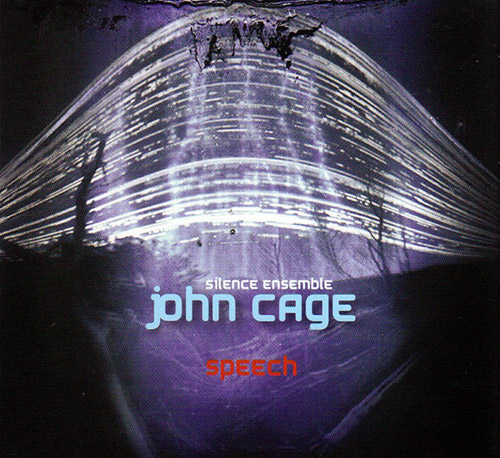
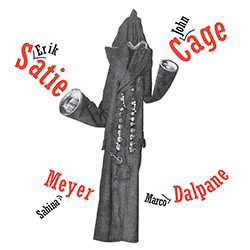
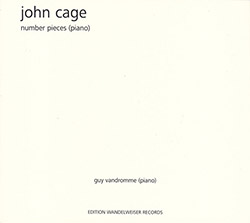


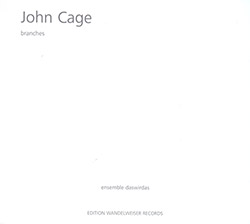
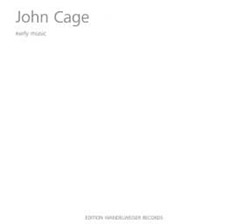



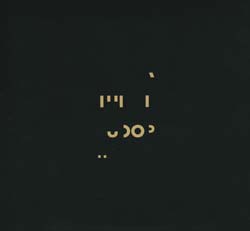
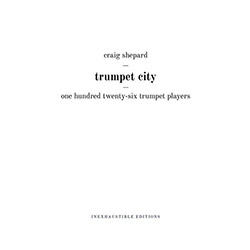
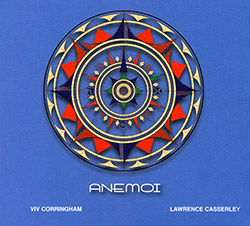
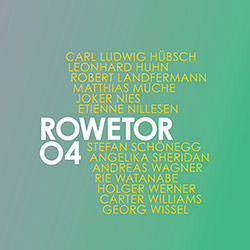


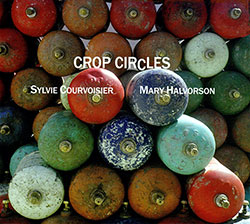
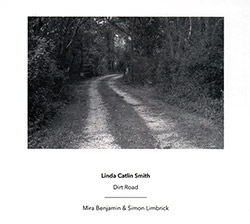

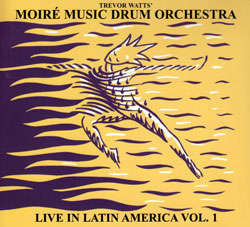




![BlueRing Improvisers: Materia [2 CDs]](https://www.teuthida.com/productImages/misc4/36513.jpg)








![Wheelhouse (Rempis / Adasiewicz / McBride): House And Home [VINYL]](https://www.teuthida.com/productImages/misc4/36462.jpg)
![+DOG+: The Light Of Our Lives [2 CDs]](https://www.teuthida.com/productImages/misc4/36009.jpg)


![Parker, Evan / Jean-Marc Foussat: Insolence [VINYL]](https://www.teuthida.com/productImages/misc4/36398.jpg)










![Deupree, Jerome / Sylvie Courvoisier / Lester St. Louis / Joe Morris: Canyon [2 CDs]](https://www.teuthida.com/productImages/misc4/36404.jpg)



![Eventless Plot | Haarvol: The Subliminal Paths [CASSETTE + DOWNLOAD]](https://www.teuthida.com/productImages/misc4/36232.jpg)










![Eventless Plot | Francesco Covarino: Methexis [CASSETTE + DOWNLOAD]](https://www.teuthida.com/productImages/misc4/36231.jpg)



![Das B (Mazen Kerbaj / Mike Majkowski / Magda Mayas / Tony Buck): Love [VINYL]](https://www.teuthida.com/productImages/misc4/36329.jpg)


![Eternities: Rides Again [CASSETTE]](https://www.teuthida.com/productImages/misc4/36247.jpg)
![Lopez, Francisco: Untitled (2021-2022) [2 CDs]](https://www.teuthida.com/productImages/misc4/36438.jpg)






![Money : Money 2 [2 CDs]](https://www.teuthida.com/productImages/misc4/35894.jpg)




![Klinga, Erik: Elusive Shimmer [VINYL]](https://www.teuthida.com/productImages/misc4/36258.jpg)
![CHANGES TO blind (Phil Zampino): Volume 9 - I Wave on a Fine Vile Mist [CD + DOWNLOAD]](https://www.teuthida.com/productImages/misc4/36061.jpg)

![Wallmart / Rubbish: Asset Protection [split CD]](https://www.teuthida.com/productImages/misc4/35900.jpg)


![+Dog+: The Family Music Book Vol. 5 [2 CDs]](https://www.teuthida.com/productImages/misc4/35897.jpg)
![Kuvveti, Deli : Kuslar Soyledi [CASSETTE w/ DOWNLOAD]](https://www.teuthida.com/productImages/misc4/36107.jpg)

![Brown, Dan / Dan Reynolds: Live At The Grange Hall [unauthorized][CASSETTE]](https://www.teuthida.com/productImages/misc4/36245.jpg)








![Palestine, Charlemagne / Seppe Gebruers: Beyondddddd The Notessssss [VINYL]](https://www.teuthida.com/productImages/misc4/36206.jpg)
![Palestine, Charlemagne / Seppe Gebruers: Beyondddddd The Notessssss [NEON GREEN VINYL]](https://www.teuthida.com/productImages/misc4/36207.jpg)

![Laubrock, Ingrid: Purposing The Air [2 CDs]](https://www.teuthida.com/productImages/misc4/35639.jpg)

![Yoko, Ono / The Great Learning Orchestra: Selected Recordings From Grapefruit [2 CDs]](https://www.teuthida.com/productImages/misc4/35841.jpg)









![Zorn, John / JACK Quartet: The Complete String Quartets [2 CDs]](https://www.teuthida.com/productImages/misc4/35609.jpg)

![Lonsdale, Eden: Dawnings [2 CDs]](https://www.teuthida.com/productImages/misc4/35480.jpg)



![Sorry For Laughing (G. Whitlow / M. Bates / Dave-Id / E. Ka-Spel): Rain Flowers [2 CDS]](https://www.teuthida.com/productImages/misc4/35985.jpg)

![Rolando, Tommaso / Andy Moor : Biscotti [CASSETTE w/ DOWNLOADS]](https://www.teuthida.com/productImages/misc4/36106.jpg)


![Electric Bird Noise / Derek Roddy: 8-10-22 [CD EP]](https://www.teuthida.com/productImages/misc4/35970.jpg)








![Elephant9 : Mythical River [VINYL]](https://www.teuthida.com/productImages/misc4/34624.jpg)



![Elephant9 with Terje Rypdal: Catching Fire [VINYL 2 LPs]](https://www.teuthida.com/productImages/misc4/35355.jpg)
![Deerlady (Obomsawin, Mali / Magdalena Abrego): Greatest Hits [VINYL]](https://www.teuthida.com/productImages/misc4/34876.jpg)







![Surplus 1980: Illusion of Consistency [CD]](https://www.teuthida.com/productImages/misc4/35069.jpg)
![Staiano, Moe: Away Towards the Light [VINYL + DOWNLOAD]](https://www.teuthida.com/productImages/misc4/35037.jpg)
![Coley, Byron: Dating Tips for Touring Bands [VINYL]](https://www.teuthida.com/productImages/misc4/17906.jpg)

![Lost Kisses: My Life is Sad & Funny [DVD]](https://www.teuthida.com/productImages/misc4/lostKissesDVD.jpg)